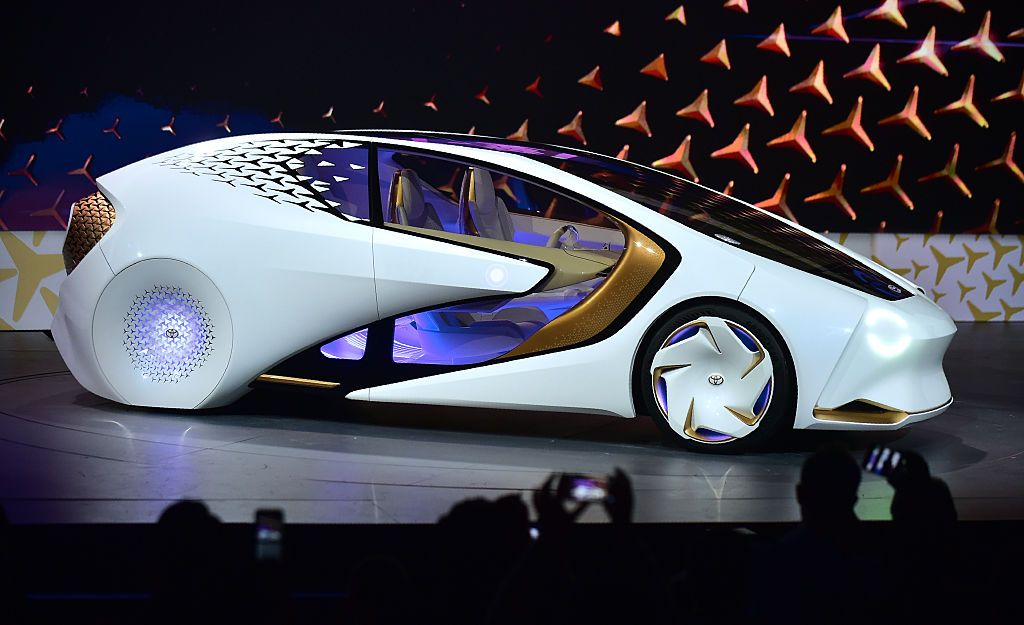The mid-to-late 1960s brought forth many competently styled American cars, but few memorably outstanding designs, in my opinion. However, one sensational design comes to mind: that of the 1966 Oldsmobile Toronado.
Toronados shared General Motors' E-Platform with the 1966 Buick Riviera and the 1967 Cadillac Eldorado. This sharing was invisible to the general public because the brands carried mostly unique sheet metal treatments, this making the cars appear distinctly different.
Toronados also were distinctive mechanically in that they featured front-wheel drive, the first U.S. application since the demise of the Cord brand in 1937.
As for the styling, a participant's account of its development is here (be sure to read it).
In the title for this post, I use the word powerful to describe the Toronado's styling. That's an exaggeration because the general shape of the body -- especially of the greenhouse -- is rather refined, bordering on delicate. That is offset by the large, bold wheelhouse rims connected by a wide, essentially flat panel. So the lower part of the car stresses power, the upper part grace. This is in contrast to American late-60s styling that tended to opt for grace.
All Cord automobiles including the 1936-37 810 and 812 models featured front-wheel drive. The 810/812 Cords also featured horizontal grill bars. The Toronado included both, so car buff magazine writers and others were quick to make a Cord connection. The 1967 Toronado facelift added vertical grille bars to create a grid pattern, thus destroying the possible Cord styling echo.
A GM publicity image of the front. Toronados had hidden headlights, yet another feature found on late Cords. Seen from this low angle, the front ensemble is strong. It also shows the tumblehome above the low side panel and how this interacts with the more vertically-sided wheelhouse flanges.
Looking down on a Toronado auctioned by Mecum. The design weakens a bit from this perspective.
MJC Classics auction photo presenting the play of light on various parts of the body.
GM side photo, perhaps of a matte-finish mockup. Here the panel forms are clear, lacking the overlay of reflections seen in the previous photo.
Rear three-quarter publicity view. This shows how the tumblehome effect blends with the C-pillar and rear quarter panel. And, especially, how the wheel surrounds contrast with this. Powerful styling here.
This is a 1936 Cord 810 for you to ponder any Toronado connections.
The mid-to-late 1960s brought forth many competently styled American cars, but few memorably outstanding designs, in my opinion. However, one sensational design comes to mind: that of the 1966 Oldsmobile Toronado.
Toronados shared General Motors' E-Platform with the 1966 Buick Riviera and the 1967 Cadillac Eldorado. This sharing was invisible to the general public because the brands carried mostly unique sheet metal treatments, this making the cars appear distinctly different.
Toronados also were distinctive mechanically in that they featured front-wheel drive, the first U.S. application since the demise of the Cord brand in 1937.
As for the styling, a participant's account of its development is here (be sure to read it).
In the title for this post, I use the word powerful to describe the Toronado's styling. That's an exaggeration because the general shape of the body -- especially of the greenhouse -- is rather refined, bordering on delicate. That is offset by the large, bold wheelhouse rims connected by a wide, essentially flat panel. So the lower part of the car stresses power, the upper part grace. This is in contrast to American late-60s styling that tended to opt for grace.
All Cord automobiles including the 1936-37 810 and 812 models featured front-wheel drive. The 810/812 Cords also featured horizontal grill bars. The Toronado included both, so car buff magazine writers and others were quick to make a Cord connection. The 1967 Toronado facelift added vertical grille bars to create a grid pattern, thus destroying the possible Cord styling echo.
A GM publicity image of the front. Toronados had hidden headlights, yet another feature found on late Cords. Seen from this low angle, the front ensemble is strong. It also shows the tumblehome above the low side panel and how this interacts with the more vertically-sided wheelhouse flanges.
Looking down on a Toronado auctioned by Mecum. The design weakens a bit from this perspective.
MJC Classics auction photo presenting the play of light on various parts of the body.
GM side photo, perhaps of a matte-finish mockup. Here the panel forms are clear, lacking the overlay of reflections seen in the previous photo.
Rear three-quarter publicity view. This shows how the tumblehome effect blends with the C-pillar and rear quarter panel. And, especially, how the wheel surrounds contrast with this. Powerful styling here.
This is a 1936 Cord 810 for you to ponder any Toronado connections.


















EmoticonEmoticon